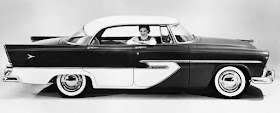The first hardtops were coupés. General Motors introduced the 4-door hardtop for the 1955 model year, a style that persisted as late as 1978 for some brands. American Motors, Ford Motor Company and Chrysler Corporation reacted quickly, marketing 4-door hardtops on some of their brands for 1956.
I should mention that hardtops, especially the 4-door variety, were not very practical when their windows were down. At all but very low speeds, back-seat passengers received a highly uncomfortable blast of air. Therefore, when moving, most such cars had their windows raised. A 4-door hardtop was at its most elegant when parked.
Some were aesthetically successful, but the 1956 Chrysler Corporation set had an awkward detail that is illustrated below. Unless noted, the images are from factory publicity or for cars up for sale.
1955 Oldsmobile 88 Holiday 4-door. Note the aft side window is a one-piece affair.
Even though Fords would get new bodies for 1957, 4-door hardtops were added for 1956. Aft side windows were also one-piece. Mercurys and Lincolns did not have 4-door hardtops for '56.
1956 Nash Rambler Custom. This was a new body design, but the hardtop shown here was probably a 4-door sedan quickly modified for 1956 availability. The aft quarter-window is fixed other than being capable of pivoting.
1956 DeSoto Fireflite Sportsman 4-door hardtop shown with retracted windows.
1956 DeSoto Firedome Seville 4-door hardtop with windows raised. Note the aft quarter window in this Mecum auction photo.
Here is a DeSoto Firedome 4-door sedan from which the hardtop was derived. It has an aft quarter window that pivots. The shapes of these quarter windows differ.
A somewhat worse-for-wear Firedome Seville. This photo shows how 1956 Chrysler Corporation 4-door hardtop windows retracted. On DeSotos and Chryslers, the rear doors extended over the wheel wells and were shaped so that fully-retractable windows had to be narrower than belt line door width. This can be seen in this photo and the previous one. In order to achieve a pillarless look, main rear windows and quarter windows both had to retract into the limited available door space. The result was not as clean as GM and Ford were able to achieve, hence my claim of awkwardness for Chrysler's solution. Chrysler Corporation cars got new bodies for 1957 and 4-door hardtops got cleanly designed side windows.
1956 Chrysler New Yorker 4-door hardtop with windows raised.
1956 Dodge Royal Lancer 4-door hardtop. Dodges and Plymouths had different bodies than the more expensive DeSotos and Chryslers, but the side/quarter window retraction scheme was the same.
1956 Dodge Custom Royal 4-door sedan. Its rear door has a different shape than the hardtop's. The latter is wider below the C-pillar to accommodate quarter window retraction. The sedan's quarter window only pivots.
I don't have a photo of a Plymouth 4-door hardtop with rolled-up windows, so this publicity photo of a Belvedere Sport Sedan with retracted windows will have to do.











'57 Ford 4 door hardtops had a blank wedge at the back end of the rear door window in order that it could roll down, which they cleverly turned into a design thing by working it in with the chrome rear window frame. Later cars like '62 and '63-64 Dodges and Plymouths took different approaches to the problem (same basic body but different solutions for '62 and '63-4).
ReplyDeleteIt was a one year only body style. And it was ingenious because the window filled the total width of the sedan size opening. The sport sedans from other makers had to shorten the width of the windows to get the windows in the doors. One time at Chryslers at Carlisle, I came across at 56 Chrysler Newport sedan, in rough condition, with the roof sawed off. I walked over, pushed the window switch in the rear door and the window just glided right up quiet and perfect. It was well engineered solution, made entry and exit to the back seat easier. Chrysler was among the first to use electric windows, and electric wipers, starting in 1950.
ReplyDelete